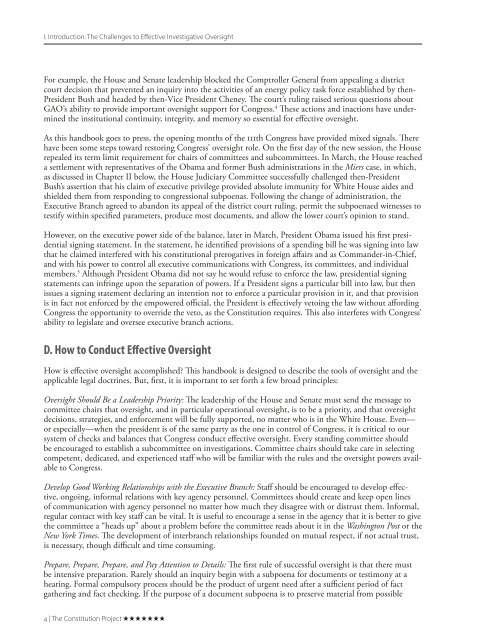When Congress Comes Calling
WhenCongressComesCalling
WhenCongressComesCalling
Create successful ePaper yourself
Turn your PDF publications into a flip-book with our unique Google optimized e-Paper software.
I. Introduction: The Challenges to Effective Investigative Oversight<br />
For example, the House and Senate leadership blocked the Comptroller General from appealing a district<br />
court decision that prevented an inquiry into the activities of an energy policy task force established by then-<br />
President Bush and headed by then-Vice President Cheney. The court’s ruling raised serious questions about<br />
GAO’s ability to provide important oversight support for <strong>Congress</strong>. 4 These actions and inactions have undermined<br />
the institutional continuity, integrity, and memory so essential for effective oversight.<br />
As this handbook goes to press, the opening months of the 111th <strong>Congress</strong> have provided mixed signals. There<br />
have been some steps toward restoring <strong>Congress</strong>’ oversight role. On the first day of the new session, the House<br />
repealed its term limit requirement for chairs of committees and subcommittees. In March, the House reached<br />
a settlement with representatives of the Obama and former Bush administrations in the Miers case, in which,<br />
as discussed in Chapter II below, the House Judiciary Committee successfully challenged then-President<br />
Bush’s assertion that his claim of executive privilege provided absolute immunity for White House aides and<br />
shielded them from responding to congressional subpoenas. Following the change of administration, the<br />
Executive Branch agreed to abandon its appeal of the district court ruling, permit the subpoenaed witnesses to<br />
testify within specified parameters, produce most documents, and allow the lower court’s opinion to stand.<br />
However, on the executive power side of the balance, later in March, President Obama issued his first presidential<br />
signing statement. In the statement, he identified provisions of a spending bill he was signing into law<br />
that he claimed interfered with his constitutional prerogatives in foreign affairs and as Commander-in-Chief,<br />
and with his power to control all executive communications with <strong>Congress</strong>, its committees, and individual<br />
members. 5 Although President Obama did not say he would refuse to enforce the law, presidential signing<br />
statements can infringe upon the separation of powers. If a President signs a particular bill into law, but then<br />
issues a signing statement declaring an intention not to enforce a particular provision in it, and that provision<br />
is in fact not enforced by the empowered official, the President is effectively vetoing the law without affording<br />
<strong>Congress</strong> the opportunity to override the veto, as the Constitution requires. This also interferes with <strong>Congress</strong>’<br />
ability to legislate and oversee executive branch actions.<br />
D. How to Conduct Effective Oversight<br />
How is effective oversight accomplished? This handbook is designed to describe the tools of oversight and the<br />
applicable legal doctrines. But, first, it is important to set forth a few broad principles:<br />
Oversight Should Be a Leadership Priority: The leadership of the House and Senate must send the message to<br />
committee chairs that oversight, and in particular operational oversight, is to be a priority, and that oversight<br />
decisions, strategies, and enforcement will be fully supported, no matter who is in the White House. Even—<br />
or especially—when the president is of the same party as the one in control of <strong>Congress</strong>, it is critical to our<br />
system of checks and balances that <strong>Congress</strong> conduct effective oversight. Every standing committee should<br />
be encouraged to establish a subcommittee on investigations. Committee chairs should take care in selecting<br />
competent, dedicated, and experienced staff who will be familiar with the rules and the oversight powers available<br />
to <strong>Congress</strong>.<br />
Develop Good Working Relationships with the Executive Branch: Staff should be encouraged to develop effective,<br />
ongoing, informal relations with key agency personnel. Committees should create and keep open lines<br />
of communication with agency personnel no matter how much they disagree with or distrust them. Informal,<br />
regular contact with key staff can be vital. It is useful to encourage a sense in the agency that it is better to give<br />
the committee a “heads up” about a problem before the committee reads about it in the Washington Post or the<br />
New York Times. The development of interbranch relationships founded on mutual respect, if not actual trust,<br />
is necessary, though difficult and time consuming.<br />
Prepare, Prepare, Prepare, and Pay Attention to Details: The first rule of successful oversight is that there must<br />
be intensive preparation. Rarely should an inquiry begin with a subpoena for documents or testimony at a<br />
hearing. Formal compulsory process should be the product of urgent need after a sufficient period of fact<br />
gathering and fact checking. If the purpose of a document subpoena is to preserve material from possible<br />
4 | The Constitution Project


